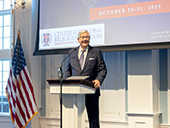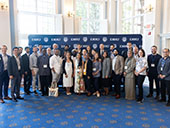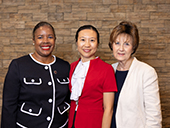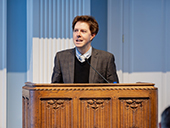Foreign Policy Experts Discuss NATO and the War in Ukraine During the Leadership Lecture Series at DBU
This article is over six months old and may reference former titles for DBU faculty or staff, discontinued programs, or other details that have since changed. If you have any questions, please contact us at news@dbu.edu, or (214) 333-5172.
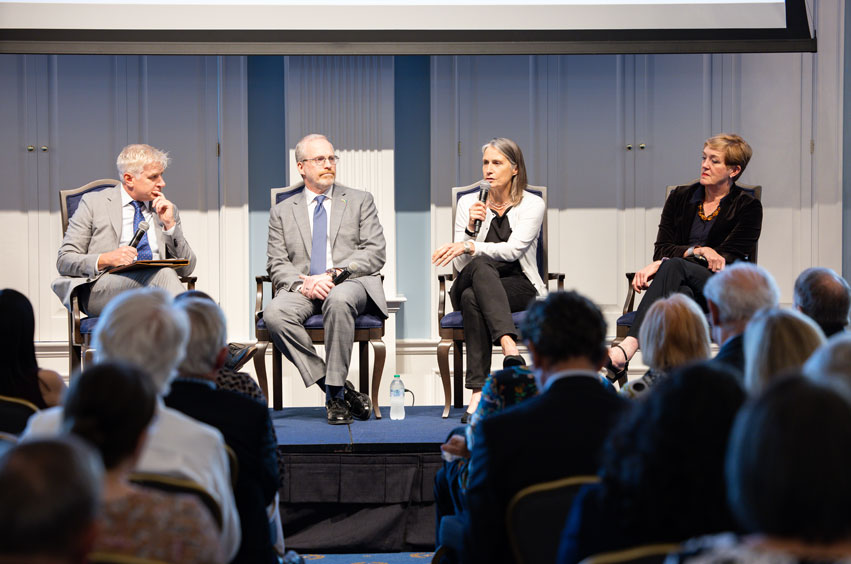
On September 12, the Institute for Global Engagement hosted the latest Leadership Lecture Series at DBU, featuring members from the World Affairs Council and the Brookings Institution. Jonathan Fechner, Executive Director of DBU's Institute for Global Engagement, welcomed the attendees and shared about DBU's devotion to engaging in public policy through a Christian worldview. The event focused on American foreign policy toward Ukraine, Russia, the North Atlantic Treaty Organization (NATO), and beyond in 2024. Foreign policy experts were in attendance and discussed the topic in detail with the attendees.
With the event taking place the day after September 11th, the Day of Remembrance, Fechner spoke about the 2,977 American flags neatly displayed in front of Pilgrim Chapel by DBU students. Each flag signifies a loss of life on the tragic day of September 11, 2001. Fechner stated, "I think it's fitting that 23 years later, we are talking about democracy and freedom globally today."
Fechner introduced Liz Brailsford, the CEO of the World Affairs Council of Dallas Fort Worth. She thanked DBU for hosting the event and the Brookings Institution and Dallas Morning News for partnering with them. Brailsford shared that this year marks NATO's 75th anniversary and that the conversation about the United States' involvement with Ukraine is paramount. Brailsford introduced the panel of three incredibly accomplished experts within their respective fields.
The first-panel speaker, Fiona Hill, serves as Senior Fellow in the Center on the United States and Europe within the foreign policy program at the Brookings Institution. She previously worked as Deputy Assistant to the president and was Senior Director for European and Russian affairs on the U.S. National Security Council from 2017-2019. From 2006-2009, Fiona Hill served as the National Intelligence Officer for Russia and Eurasia at the U.S. National Intelligence Council.
Fiona Hill was joined by David J. Kramer, Executive Director of the George W. Bush Institute. He served eight years in the United States Department of State during the George. W. Bush's administration and as the Assistant Secretary of State for Democracy, Human Rights, and Labor. He also served as Deputy Assistant Secretary of State for European and Eurasian affairs and the Executive Director of the U.S. Advisory Commission on Public Diplomacy in Washington, D.C.
The final panel member was Costanze Stelzenmüller, the Director of the United States and Europe for the Brookings Institution. She is the inaugural holder of the Fritz Stern Chair on Germany and transatlantic relations at Brookings. Stelzenmüller previously held the Kissinger Chair on Foreign Policy and International Relations at the Library of Congress from 2019-2020 and, from the years 2014-2019, served as the Inaugural Robert Bosch Senior Fellow at Brookings.
Rudolph "Rudy" Bush, the Editorial Page Editor and Vice President at Dallas Morning News, moderated the conversation. He previously served as Deputy Editorial Page Editor at Dallas Morning News, covered crime and the federal courts, and was a national correspondent at the Chicago Tribune.
The distinguished panel was welcomed with applause as Bush introduced the important topic of world affairs, focusing on the Russian invasion of Ukraine. Within this conversation, the experts were asked questions on issues such as the war to defend Ukraine's independence and the role of the West supporting Ukrainian allies.
Bush provided a brief refresher about Russia and Ukraine and the ongoing tension. Russia invaded the Crimean Peninsula in the Southeastern part of Ukraine and illegally annexed it in 2014. Around eight years after the illegal annexation of the Crimean Peninsula, Russia waged a full-fledged invasion of Ukraine. During the first siege, Russia attempted and failed to take the capital Kyiv. "Ukrainian forces have since staged a bold defense and bold counteroffensive. Retaking much of their lost territory," Bush explained.
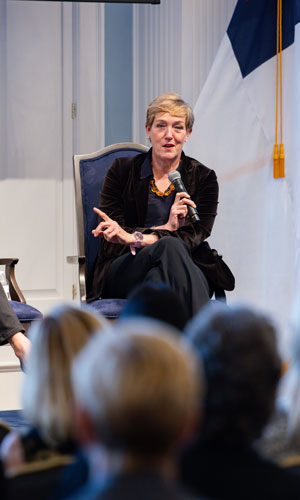
Hill thanked Bush and DBU before diving into his question. Hill replied with heaviness, "What we're seeing unfolding in Ukraine has taken us back decades." The Ukraine and Russian conflict is the largest war in Europe since World War II. Hill shared the importance of NATO and how the security alliance was designed to prevent and deter a reoccurrence of the Great War for the majority of the 20th century. Hill remarked, "It is infrequent in international affairs that the question of right and wrong is as clear as it is in this case." In her response to the question, she states what is understood by everyone in the room. Putin attacked a country that did nothing to him.
Stelzenmüller added, "This is also about the security of Europe, which is also an American first order of strategic interest." Although Ukraine is Putin's point of interest, he also looks beyond Ukraine to the rest of the continent. Stelzenmüller stated her final point with gravity, "It has been clear from the beginning that Putin has not only Ukraine in his sight but the stability, safety, and security of Europe at large."
Bush directed a question toward Kramer about what is at stake with the war in Ukraine. Currently, what can be seen is that there is a war between freedom and authoritarianism. He shared that Ukraine is being deprived of its freedom and independence. "If Putin is not stopped in Ukraine… he will not stop there." Kramer's contention was that he would seek to push his regime beyond other countries.
Kramer pointed out that Ukraine has survived due to the heroism of the Ukrainian people. The Ukrainian military has put up a solid defense and counteroffensive against Russian soldiers, to the point that they are now in Kursk, a city in Russia. Kramer shared that the world is watching how America reacts and handles the war and the alliance with Ukraine.
Hill shared that Putin has been in power for over 25 years, which is a crucial part of the problem. When comparing the governments of the United States and the United Kingdom to Russia, Putin has longevity compared to the presidents and prime ministers who serve their terms and step down when it is time.
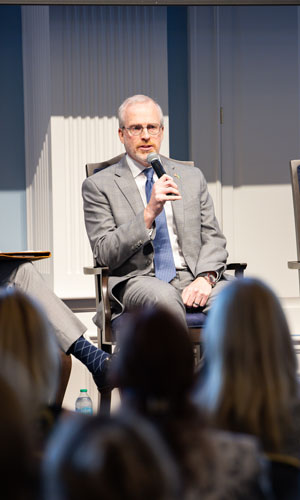
With Putin being in power for so long, he has learned to be crafty and outmaneuver others. Hill said, "It wasn't fully inevitable." At this point, Putin is thinking about his legacy, and he most likely never envisioned this at the beginning of his rule. She even referenced George Washington, as he knew when it was time to step down and to strictly avoid "replicating a toxic monarchy" much like the one "the Americans had escaped," he famously said. According to Hill, "His number one goal is regime preservation, which is his preservation."
Kramer followed up with Stelzenmüller and asked her what the European response to the war was. Stelzenmüller's response to the question discusses her meeting a Catholic Cardinal at a Security Council Conference. They were discussing the landscape of foreign policy, and she had asked him his opinion. He replied, "The Devil is in the world again." Stelzenmüller finds this a very apt description of what is happening then and now.
The Russians are waging a hybrid war in Europe, not a kinetic war with missiles, but they are committing acts of sabotage with physical and digital infrastructure. There was even an attempt on the life of a German CEO of one of Germany's major defense companies.
Bush turned to Kramer to direct his next question for him. The question involved the Ukrainian response and why the response has been a surprise. Kramer talks about analysts who believed Russia would take over the country quickly and win the war relatively immediately. "The Ukrainians have regained more than 50% of the territory that Russia initially seized. They've nearly destroyed the Black Sea fleet, which is essential to Russia's naval security. They have also reestablished the export route through Odesa, which is important to Ukraine and the world."
Bush took this opportunity to introduce the question of unity with the upcoming presidential election. He asked the panel how the election results could affect the war. Hill was the first to respond and noted that the election and its outcome are being watched by the world.
According to Hill, the election is a test of whether the U.S. still possesses the strength to be a global leader and a major trend-setting country. She highlighted that if Putin got his way, he would show that the United States is fragile. "The hope of the Founding Fathers in America would be a force for good and light in the world is also at stake. The more that the United States looks in disarray, the more that people like Putin think they can sow chaos globally," Fiona said.
Kramer also answered the question and added to the discussion with the military aid being given to Ukraine. "There are no American soldiers on the ground in Ukraine." It is crucial that Ukraine has military assistance through weaponry and other military equipment. Kramer shares, "Less than 5% of the Pentagon's budget has gone to help the Ukrainians." The aid being given to Ukraine is crucial for the country's survival and freedom. Kramer overall shares that we cannot have what is called "Ukraine Fatigue" because there are lives of Ukrainians at stake, and America cannot consign them to Russian control.
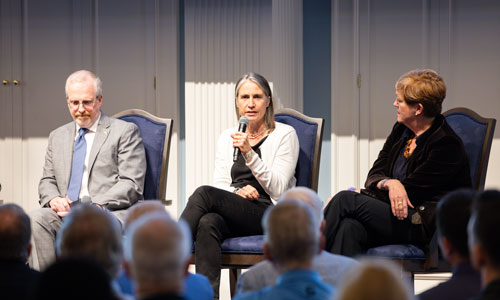
Stelzenmüller reflected on her testifying in 2017 in front of the Senate select committee on Russian interference in European elections. In comparing what she knew then to what she knows now, the difference is like night and day. "At the time, I thought I did a fairly thorough job and hardnosed assessment of what Russians were trying to do on the basis of open-source intelligence." The difference in the level of what the Russians are doing goes beyond what was previously known. She firmly stated, "The quantitative and qualitative intensity of Russian attacks on people, the attempts to buy people, and the attempts on the information space to mess with people's heads is extraordinary."
She also referenced Kramer's comment on the massive loss of Russian soldiers. She specifically noted that Russia increased the contract fees by 2 to 3x and is still struggling to gain soldiers. "What Putin is to do across the world, across the globe, in terms of sacrificing his own people, should certainly give us pause." Hill referred to Stelzenmüller's point that Germany should take time to notice the patterns and accept them for what they are.
As the event drew near the end, Bush asked how the war could play out and what each panelist hoped for the outcome to be. With a sad look on her face, Stelzenmüller responded to this question. She talked about how there are so many variables at play. "I think the likelihood of a swift and complete success by Ukraine is the least probable case here." Stelzenmüller assured the audience that much will be done to prevent an "outright Russian victory," but overall, we will see a "long-lasting war of attrition." She believes if we allow Ukraine to fall, "A great deal of damage will be dealt to the fabric of European and Western Democracies."
"Vladamir Putin is in the chaos business… Putin is being called 'The Moth' behind his back in Russia," Hill shared. In Russian folklore and mythology, moths are the harbinger of destruction and death. Even the Russian people fear Putin and his plans. "It will take time before the Russian people take any action to change any type of calculations." Hill continued about how we, as the West, can reach a desirable endgame. "We're going to have to change the global calculation—that working with Russia is not beneficial for anyone involved."
Bush thanked Hill before motioning to Kramer to proceed with answering the question. "I remain cautiously optimistic that the Ukrainians can achieve victory, although, I agree, not swiftly. It will take time." Victory, defined by Kramer, would be removing all Russian soldiers from Ukraine and having Russia be held fully accountable. He candidly shared that the reason for his cautious optimism is because of the United States. "I have much more confidence and optimism, frankly, with Ukrainians than I do in the rest of us."
Kramer reflects on Putin's threats of nuclear warfare and firmly contends, "Let's remember, we are the United States of America, and we have warned the Russians. Should they use a tactical nuclear weapon, we will respond militarily, not necessarily with a nuclear weapon, but they will lose support."
The final question, directed to Stelzenmüller, was, "Central Europe used to be a buffer for Western Europe; now it is Ukraine. They are the hinge on the door to Europe. What do you think will be some contributing factors to how the EU fosters more solidarity with Ukraine? How can the average citizen in Europe help grow this mindset?"
Stelzenmüller took a deep breath before beginning to state her answer. "We shouldn't always ask ordinary people to be heroic." She believes that heroism from civilians is a lot to ask for when there is global unrest. Stelzenmüller noted that people can be heroic in short bursts but not for extended periods of time. "The whole point of representative democracy, and democratic institutions, is to allow people not to be heroic all the time."
The Institute for Global Engagement is a Christian, non-sectarian think tank dedicated to addressing issues in the public square with biblical distinctiveness. The mission of the IGE is to be a moral and spiritual catalyst for renewal in our culture. Founded in 2015, the IGE values the biblical narrative, thoughtful consideration, and gracious civility.
Valerie Colbert writes for University Communications at Dallas Baptist University.

